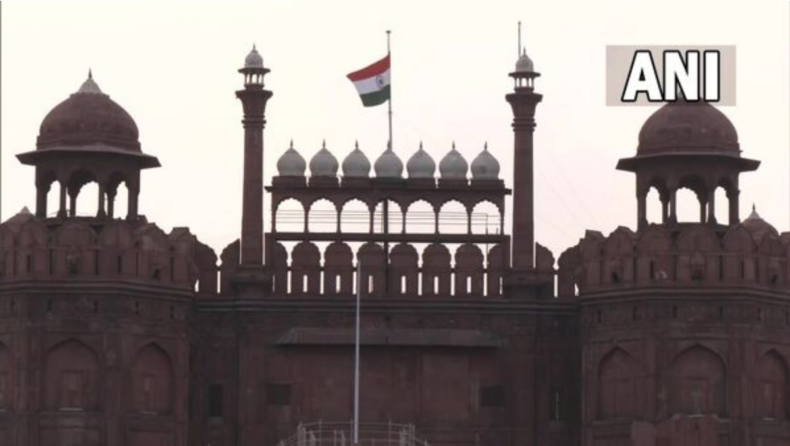On 11 September, the Indian union observed a 1-day state mourning for the peaceful demise of Queen Elizabeth 2. The UK’s longest reigning monarch, 96 breathed her last on 8 September, in Balmoral, Scotland.
According to the official statement, the national flags were being flown at half-staff all around the country on all the premises where it was flown regularly.
Ironically, the news of the Queen’s death reached India after the inauguration of Central Vista Avenue, which is called the end of the symbol of colonialism.
The Prime Minister while inaugurating the infrastructure, said, “Today, we have left the past behind and are painting a new picture for the future. The symbol of colonialism, the Kingsway or Rajpath, is a part of history now, has been erased forever.”

After Queen’s passing, the internet was filled with sad reactions from all around the world. Surprising were the ones coming from countries tyrannized by the British monarchy in the past.
Nevertheless, she was an ardent believer in peace and prosperity. With that, fondness for the Queen’s personality and respect for her agility, compassion, and punctuality at such age, were also fitting reasons behind those reactions.
Now behind the joyful and sarcastic reaction to the death of the Queen, there is an understandable cause. The British empire oppressed India for about 200 years and it is still reeling under the effect. Although it has very well-tried and nearly succeeded in standing again facing the world leaders in the matter of socio-economic development, the scars remain.
No Indian can just move on from that horrific era. So, the happy reaction to Queen Elizabeth 2’s demise is lucid.
For whom, India declares state mourning?
As per the guidelines from the home ministry, a ‘national funeral’ is announced for the death of the president, prime ministers, sitting cabinet minister, former governor, Lok Sabha speaker, chief justice of India, chief minister, Bharat Ratna awardees, and other dignitaries.
Still, the power resides in the hands of the union government to order a ‘state funeral’ for other respectable notable persons, who have anyhow contributed to the betterment of the nation.
This year, after the tragic demise of former Prime Minister of Japan, Shinzo Abe too, national mourning was observed.
Then, why is India mourning Queen Elizabeth 2’s demise?
As per several reports, it is said that the Queen had a very compassionate attachment to India. And of the long-standing history between India and the UK, she visited India thrice in her lifetime.
- In 1961, during the rule of Prime Minister Jawaharlal Nehru.
- In 1983 during Indira Gandhi’s tenure.
- In 1997, was her last visit to India and the then Prime Minister I.K. Gujral welcomed her.
Along with several significant political leaders, she has invited notable art and culture artists from India to her Buckingham Palace on several occasions. These activities have, somewhere, worked in the favor of India in glorifying its diversified culture. More than 2 million UK citizens have their descendants and family links with India. So, this affects the Indian artistic business strategy and market.
Apart from these non-political interests, India-UK trade ties can also be a key determining factor behind this action. On 29 July 2022, India-UK completed its fifth round of talks for a Free Trade Agreement.
Importing and exporting products and services will be with much ease and fewer barriers if the agreement is signed between India and the United Kingdom. It is expected to go through the final scanning in October 2022. It will cover the tariff by 90% and trade services will be enhanced by 60%.
The latest financial reports in April 2022, show that the bilateral trade between the countries has increased through the years and it amounts to US$13.1 billion in FY 2020-2021.
So, after assessing all these circumstances, the response coming from Indian citizens and the government’s decision of India mourning the demise of Queen Elizabeth 2 seems to have a well-balanced portion of nationalism as well as humility.
Read more: Queen Elizabeth II Deceased













